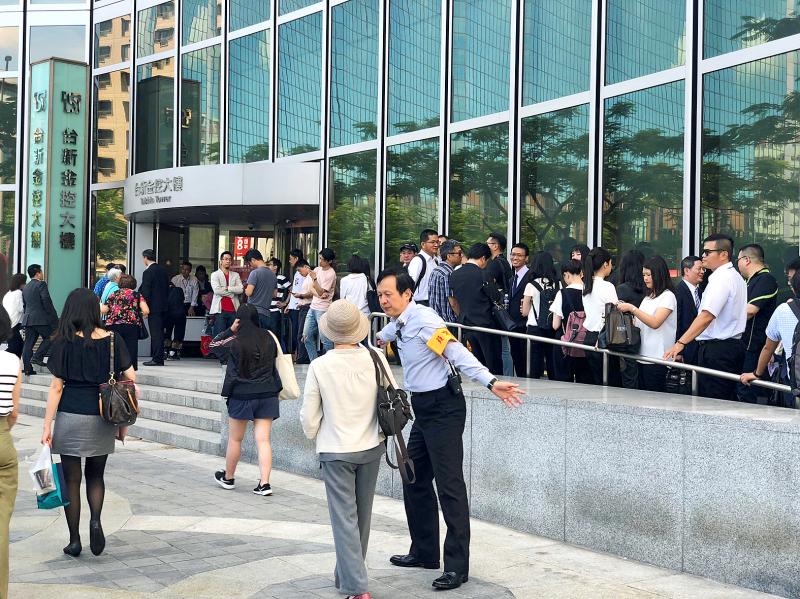The Financial Supervisory Commission (FSC) has yet to approve Taishin Financial Holding Co’s (台新金控) bid for Prudential Life Insurance Co of Taiwan (保德信人壽), although the Fair Trade Commission approved the planned takeover in November last year.
The commission last week said that it needs more information from Taishin Financial, which filed its takeover application on Jan. 8, regarding its financial resources and investment plans.
Taishin Financial in August last year announced that it aims to acquire the life insurer for NT$5.5 billion to NT$8.5 billion (US$193.74 million to US$299.42 million), and that it would take a short-term loan and consider selling 300 million shares of state-run Chang Hwa Bank (CHB, 彰化銀行) to fund the deal.

Photo: CNA
“We are assessing whether Taishin Financial’s plan would affect its financial stability,” Banking Bureau Director-General Sherri Chuang (莊琇媛) said on Thursday.
The commission has not received all required information from Taishin Financial, Chuang added.
“We would like to know from Taishin Financial whether Prudential Life needs a capital injection to comply with stricter regulations on adequacy or solvency,” as stipulated in the International Financial Reporting Standards 17, which are to take effect in 2025, and the new Insurance Capital Standard, which is to take effect a year later, Insurance Bureau Director-General Shih Chiung-hwa (施瓊華) said.
“We want to know if Taishin Financial has enough capital to address the requirements,” Shih said.
As for Taishin Financial’s plan to sell CHB shares, it needs to present a clear and workable schedule, she added.

Sweeping policy changes under US Secretary of Health and Human Services Robert F. Kennedy Jr are having a chilling effect on vaccine makers as anti-vaccine rhetoric has turned into concrete changes in inoculation schedules and recommendations, investors and executives said. The administration of US President Donald Trump has in the past year upended vaccine recommendations, with the country last month ending its longstanding guidance that all children receive inoculations against flu, hepatitis A and other diseases. The unprecedented changes have led to diminished vaccine usage, hurt the investment case for some biotechs, and created a drag that would likely dent revenues and

Global semiconductor stocks advanced yesterday, as comments by Nvidia Corp chief executive officer Jensen Huang (黃仁勳) at Davos, Switzerland, helped reinforce investor enthusiasm for artificial intelligence (AI). Samsung Electronics Co gained as much as 5 percent to an all-time high, helping drive South Korea’s benchmark KOSPI above 5,000 for the first time. That came after the Philadelphia Semiconductor Index rose more than 3 percent to a fresh record on Wednesday, with a boost from Nvidia. The gains came amid broad risk-on trade after US President Donald Trump withdrew his threat of tariffs on some European nations over backing for Greenland. Huang further

Nvidia Corp’s GB300 platform is expected to account for 70 to 80 percent of global artificial intelligence (AI) server rack shipments this year, while adoption of its next-generation Vera Rubin 200 platform is to gradually gain momentum after the third quarter of the year, TrendForce Corp (集邦科技) said. Servers based on Nvidia’s GB300 chips entered mass production last quarter and they are expected to become the mainstay models for Taiwanese server manufacturers this year, Trendforce analyst Frank Kung (龔明德) said in an interview. This year is expected to be a breakout year for AI servers based on a variety of chips, as

HSBC Bank Taiwan Ltd (匯豐台灣商銀) and the Taiwan High Prosecutors Office recently signed a memorandum of understanding (MOU) to enhance cooperation on the suspicious transaction analysis mechanism. This landmark agreement makes HSBC the first foreign bank in Taiwan to establish such a partnership with the High Prosecutors Office, underscoring its commitment to active anti-fraud initiatives, financial inclusion, and the “Treating Customers Fairly” principle. Through this deep public-private collaboration, both parties aim to co-create a secure financial ecosystem via early warning detection and precise fraud prevention technologies. At the signing ceremony, HSBC Taiwan CEO and head of banking Adam Chen (陳志堅)